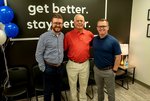The story of Cedar Recovery begins in 2015 with Joe Bond, who found the need to provide substance abuse help after some of his family members struggled with addiction.
There are now …
This item is available in full to subscribers.
To continue reading, you will need to either log in to your subscriber account, or purchase a new subscription.
If you are a current print subscriber, you can set up a free website account and connect your subscription to it by clicking here.
If you are a digital subscriber with an active, online-only subscription then you already have an account here. Just reset your password if you've not yet logged in to your account on this new site.
Otherwise, click here to view your options for subscribing.
Please log in to continue |



The story of Cedar Recovery begins in 2015 with Joe Bond, who found the need to provide substance abuse help after some of his family members struggled with addiction.
There are now four locations: Columbia, Mt. Juliet, Lebanon, and Shelbyville, which is the newest location.
Cedar Recovery recently moved from Suite 105 to Suite 101 in the Vanderbilt Plaza to provide more space. Shelbyville Bedford Chamber of Commerce held a ribbon cutting ceremony on Aug. 12 to celebrate the center’s opening since their start last February.
When choosing where to put the next recovery center, members of the Cedar saw the need for a recovery place here in Bedford County after looking at data to detect where the “hotspots” would be.
“We noticed that Shelbyville was one of those hotspots mainly because we didn’t see any quality providers—not necessarily because we saw there was anything crazy, like overdose statistics or anything along those lines,” said Heath Loyd, Cedar’s business development manager.
In fact, drug overdoses in Bedford were 14 deaths in 2019, according to the Tennessee State website. Loyd has been a part of Cedar since 2019 and the business development manager since January. His father, Dr. Stephen Loyd, is the chief medical officer and has been a former substance abuser himself in recovery since 2004.
Which is in part why at Cedar Recovery they believe in “meeting people where they are.” There’s no “3-strike” rule or “tough love.”
“Basically, what we like to incorporate is a semi-harm reduction strategy...” said Loyd. “There’s nothing in literature that dictates kicking somebody out for an inconsistent urine drug screen is beneficial to their recovery.”
In fact, the research Loyd said they have done shows relapse is part of recovery. And the proper response is not to throw shame or judgement, but to show love, rather than become a hindrance, Loyd said.
Instead, Loyd said the largest need from their patients is case management work—which is really the most challenging piece. “What we see is people come in with some pretty tough family histories and have had some trauma themselves and they’re dealing with quite a bit,” said Loyd. So, their focus is on health, home, purpose, and community.
“Where a lot of this stuff is lacking is on how we can reintegrate some of these folks back into society to make it feel part of a community,” he said.
So, what does that look like specifically?
First, it depends on the patient’s needs and whether he or she needs group or individual therapy.
“We have doctors and therapists here. We provide substance abuse treatment—mostly suboxone and therapy,” said Angel Turrentine, office coordinator and certified medical assistant at the Shelbyville location.
Suboxone is a medication that helps patients stop craving. It has been shown to lower the risk of fatal overdoses by 50 percent, according to a Harvard Health Publishing article. This is paired with therapy, which works long-term.
Additionally, Cedar Recovery looks to maintain “open communication” with their patients.
“When I say open communication, the patients always know they can call,” said Turrentine. “We have Podium as well, so they can text message... We have people after hours sometimes who can check text messages and get back with patients...”
For many of the staff, their own personal story with substance abuse helps to connect with patients. Turrentine said she came to work with Cedar Recovery to help those struggling with substance abuse, like her brother.
“My background comes from, OK, if my brother can overcome it and I can be patient with him, then I know I can be patient with other people—because that was hard,” she said.
Through partner relationships, they also have Intensive outpatient care such as with Health Connect America, who can provide therapy in people’s homes, all in part to meet people where they are.
“Now I actually get a chance to help people by doing this,” said Loyd.